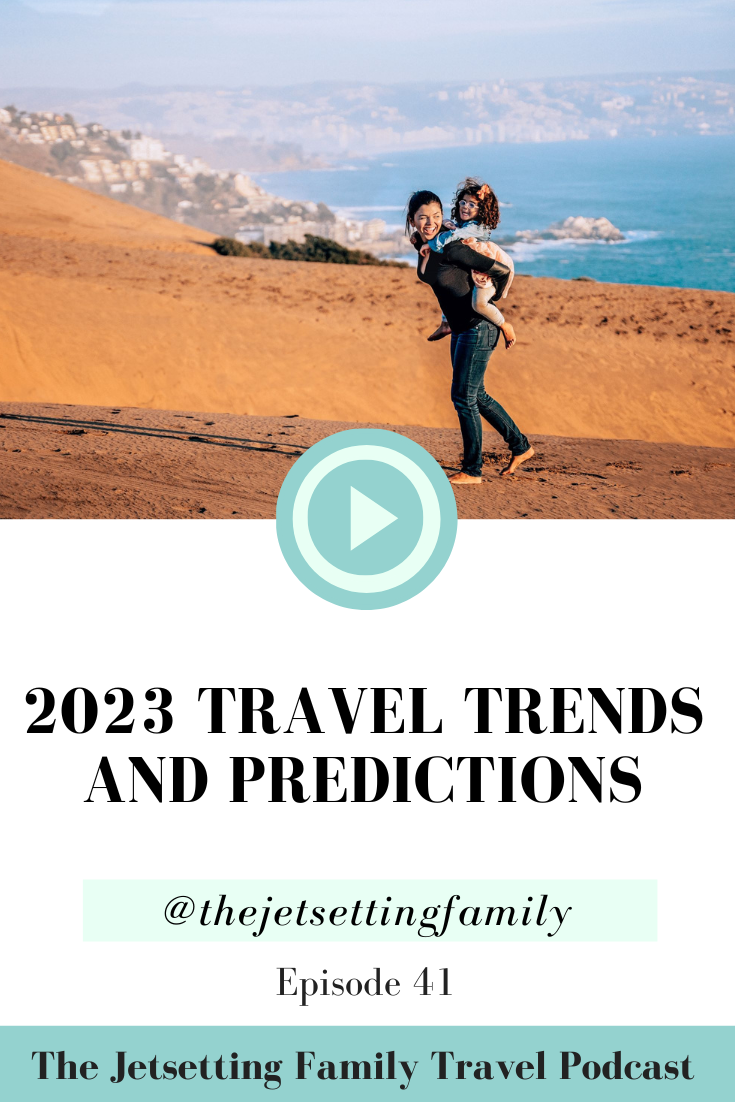There’s been a lot of interesting trends kicking off 2023… Now that we’re stepping away from the shadow of the pandemic, the travel industry is seeing record growth. How are things like AI and transformational adventures going to shape the way that we travel? Listen to this episode to find out!
Listen on: Apple Podcasts, Spotify, Google Podcasts
Transcript
Rod: Welcome to the Jetsetting Family Travel Podcast. My name’s Rod. And I’m Jess. And as we’re planning our 2023 trips, we’ve been coming across all kinds of interesting news and changes across the travel industry. So, we thought today we would focus our episode on trends for 2023. We’re really excited to be talking about the top five trends that we’ve been seeing as we’ve been booking flights, booking travel and looking into what kind of experiences we can have this year.
Jess: Yes. It’s so interesting to see how every year travel changes just a bit. I will say the last few years it’s changed more than normal, thanks to a wonderful thing called COVID. But I think people are looking for new things in the coming years. They’re excited to travel again. And so, with that comes things like our first trend we’ve seen, which is all you can fly passes.
We have seen this now for a couple years, at least with Southwest Airlines credit card rewards. You can get the Southwest Airlines Companion Pass, which isn’t like an all-inclusive pass in the sense that you have to get a credit card and then you get to choose one person who can use the perks for the year,
Rod: Or you have to fly like a hundred times in order to earn a companion pass. This one’s a little bit different.
Jess: Yes, so this year we’re seeing, especially Frontier Airlines, they just announced their summer pass. It’s $399 for unlimited flights, May through September 30th. They also have a yearlong pass. So, there are these different passes where you’re paying in a flat rate and then you can fly unlimited.
Something to note is there’s some important caveats with this type of pass that you just need to be aware of. So at least for Frontier Airlines, and I think other airlines may follow suit, is you can only get a seat guaranteed to you one day before domestic travel and 10 days before international travel.
So that means you might fly to a destination not knowing when you’re gonna be able to return home. Something else to note is the more people you have traveling in your party, like for us as a family of four, it might be more difficult to get four seats, the day before a trip rather than if you’re a solo traveler and there are blackout dates.
So even though it says unlimited during that timeframe, some of the main holidays or times like I’m assuming, I don’t know specifically, but I’m assuming like a 4th of July holiday or something like that is going to be a do not travel time. So just, it could be an amazing deal, especially if you’re a solo traveler.
If I was solo, had a remote job, didn’t care where I was in the world, I would be buying this pass. As a family, it’s a little trickier to decide, is this really worth it? And we do not personally live right next to a Frontier hub. And I think that’s something you should keep in mind too, whether you live close to an airport where Frontier flies in and out of frequently, because the more layovers you have, the more difficult it’s going to be to book that trip.
But I think it’s amazing that Frontier’s doing this, and I think it’s opening the door for other airlines to follow suit depending on the success of this.
Rod: Yeah, I think it’s going to be risky. I mean, honestly, my first impression was this is so awesome. We need to get this right now, get in line before they sell out of these unlimited passes.
But then once you start reading the fine print, you start seeing all the restrictions. Where for families, I don’t know if there’s a large population of families out there that would fit like that ultimate flexible lifestyle kind of vibe. Frontier is not, they’re probably not marketing to that, but those are the people that would benefit from it the most.
Maybe if you get one or two flights out of it this summer, it ends up paying for itself. But there’s also all the other associated fees that aren’t covered. Right? There’s the seat selection, there’s baggage, all of that stuff. You still have to pay. So, it’s going to be interesting. I have honestly mixed feelings about this.
Jess: I almost feel like we should buy it and be like the testers and then come back to y’all.
But the problem is, is I think if it takes off this year, even more people are going to enroll next year. And the more people that keep enrolling, the less likely you’re going to have a chance to get on the actual plane.
Rod: I’m, I’m curious right now just to see if there are even going to be flights available a day out.
Right. So that’s where the risk comes in for you as a traveler. It’s, how much flexibility can you build into your plan so that if you can’t fly for like three or four days because there’s literally no seats or no flights to get you to the next place that you want to go to, then you know you have to have a flexible hotel booking, flexible arrangements wherever you are and aybe that’s the fun of it.
Jess: I mean it’s interesting because I was very blessed that before getting married and while I was in college I flew standby because my mom worked for United Airlines. So, I essentially flew free unlimited, which is why I traveled so much at a young age. But I think it was a difference because by being an employee’s daughter, my mom could look up a flight a week, a day, a month from now and it would show exactly how many seats are empty, how many people are on standby. And so, I could always go on a trip with a calculated risk of, these are my chances of actually getting on the flight. I don’t know what systems Frontier Airline has in place to determine that, or you know, if there are a bunch of people trying to get that one day before, is it, I assume it’s going to be first come, first serve.
So, I don’t know what the frenzy is going to be because it’s not as easy to look up how many seats are truly available. I mean, I guess you could look up a seat map, but it’s just different employees have a lot more data and tools and things when you’re flying standby without an assigned seat to know what your chances are.
Rod: Yeah, I mean, I applaud Frontier for trying this out. I hope that people that buy these unlimited passes get their money’s worth from it. So, I think this year I don’t, I don’t know if we’re going to pull the trigger on it, but it’s going to be interesting. We’ll see if it continues next year. Now I think we might build an entire like trip or lifestyle into it next year or the year after that. But yeah, it’s really interesting.
Jess: Yeah, as of now we’re doing an East Coast road trip, so I don’t know how much we need Frontier, but hey, maybe this will make us change our mind. Okay. Number four, guys. A trend that is popular in 2023 or is growing is…
Rod: Free Wi-Fi on flights. It has been a long time in the making. I remember back in the day when you used to go to a hotel and you generally had to pay for Wi-Fi there too. I think hotels picked this up pretty quickly, where free Wi-Fi has offered, it’s been taking longer for airlines to follow suit. But a couple of weeks ago, Delta did announce that they’re going to start transitioning all their flights into free Wi-Fi.
So, goodbye to the days in which you are just disconnected, disconnecting going on airplane mode. I guess maybe you still have to do that. I think that might be going away too eventually anyway.
Jess: But anxiously waiting to reconnect and hearing all those pings the second you land.
Rod: Yeah. This will be an interesting one to follow. I don’t know, maybe it’s because satellites and SpaceX and Starlink are making it easier. I know we’ve seen that kind of service be implemented on cruise ships, not necessarily free. You still have to pay for that one there, but for airlines to do it, then maybe cruises will follow after that and it’ll eventually become just a general free wifi perk that travelers get that companies sponsor.
That would be the ideal world, but we’ll see how much further it goes from here
Jess: With free Wi-Fi, on flights now, you should definitely take advantage and download the app of whatever airline you’re flying with before boarding the plane, because a lot of times now they even offer free entertainment within those apps.
You’re watching movies, TV shows, whatever it may be for free, even if that plane doesn’t have like a TV screen within the back of the seat itself. A lot of cool perks. Yeah, something that wasn’t on our list but is trending and is kind of what this free Wi-Fi thing is, is a lot of these flights are no longer taking any form of payment, period.
Not even a credit card when buying things on board. Oh yeah. You have to do it through their apps. So yeah, definitely. Be prepared.
Rod: And some of the airlines I think also have like free 30 minutes, free hour if you watch these ads. . So, they’re trying to get creative in the way that they can still make their money by giving you some kind of free Wi-Fi.
But it’ll be interesting to see how this continues to evolve over the year. And if other airlines other than Delta end up picking this up.
Jess: Yeah, the next one. It’s a trend that’s happening more in 2023. This one’s newer for sure, is the artificial intelligence trend. Tell us about that….
Rod: Yeah, so if you are subscribed to our newsletter, you saw that we use a service called ChatGPT and it’s called generative AI. And what that means is you can put out a prompt that says, hey, tell me a joke about this, or tell me the top reasons why I should go to X, and it’ll spit out some really, really, Strong language and strong like paragraphs on whatever the topic is that you give it.
And there’s this company, it’s called OpenAI. They’re the ones that have led this ChatGPT development. It’s been taking off everywhere. They’ve got millions of users already. And I think it’s just a matter of time until we start seeing this across the travel industry itself. I mean, when you look at personalized travel recommendations, I think right now the way that we typically do it is you look up the place that you want to go to and you have to look up a blog post or some other list of ideas for places and things that you should go do while you’re doing it. I think with an AI tool like this, you can have your own personal kind of travel agent that is booking stuff on your behalf, that is picking the best times to travel, the right times to go to different activities and purchasing and making all those tickets and reservations for you.
So, I think, we’re barely scratching the surface of what this type of AI can do. There are risks for it, honestly. I mean, there is a lot of misinformation that these AI tools are starting to put out. So, I think as long as they start bringing down the risk and the AC and bringing up the accuracy that what these tools can do, then that’s when we’re going to start seeing some really cool benefits.
And I think it’s, I, I think it’s reasonable to expect that this year we’ll see it somewhere in the travel industry.
Jess: It’s crazy to think what it’s going to be like five, 10 years from now.
Rod: We’re going to have it on our phones are, you’re just going to say, hey, Google, or whatever new tool there is, book me a flight to this on this date and find the best hotel that’s closest to the airport there.
I can check in at [5:00] PM too. Book me these activities on these dates. And, put out a travel plan, send it to my email or put it in my phone or whatever. And it’ll do that all for you. It’s going to be crazy. I see it. I don’t know when it’s going to happen, but I see it happening.
Jess: Jump aboard the chat development train, babe.
Come on now. Another trend that to me is not surprising for 2023 guys is I think there will be, this is a personal guess, but a lot of travel to Japan. Japan has been closed. It’s one of the few countries that remained very heavily locked down. Since 2020, it’s been three years now. And there are families like ours, included, that we had travel planned to Japan, in fall of 2020.
We pushed that out to summer of 2021 and it just kept not happening. And so, there’s a lot of people who have had Japan on their list for the last three years who are finally going to have that opportunity to go and explore all that Japan has to offer. And I do think that it’s going to be a big tourist hotspot.
Unless, I don’t know, maybe everyone will go there and things number-wise. COVID will pick back up and they’ll shut down again.
Rod: Yeah. And I think on the flip side of that too, there’s, I predict, or I expect that there’s going to be other places that are going to close due to over tourism. We’ve seen, I think it was Yellowstone that closed for a little bit.
There’s been islands and beaches in the Philippines that have closed due to over tourism. We’ve been hearing there’s massive drought in the Hawaiian Islands and Maui in particular. So, there’s a lot of worry and it’s going to be interesting to see how tourism boards and governments respond to that if they actually do end up closing different things.
I think Machu Picchu closed shortly for, for a short time to make some changes or things that they needed. But I think now that travel has opened up and governments may or may not have been prepared for the extra amount of tourists that are going to all of these places. It’s very reasonable to think that, yeah, one of the places that you love to visit might be closed for either changes or infrastructure.
Just to be sure that they can responsibly handle the new and higher amount of tourists that are coming to those areas.
Jess: And I think something that was announced on the news this week too, that’s kind of related to that is Americans will now be charged to go to Europe in 2023.
I think this comes down to. Well, it says the end of fee free travel to the European Union. So I think that. This comes down to what Rod says. I think people are trying to gain like a better, I don’t know, understanding of how tourism is impacting countries. I think that tourism will always be a huge part of different countries’ economies, but I also think in some places where they don’t have the infrastructure for all of the people going there.
Even though they’re making a lot of money, the damage it’s causing is costing them a lot. And some of the changes are irreversible, where even with money coming in, they can’t change that. So, I think countries, I do maybe not expect this in 2023 from a ton of places. Obviously, Europe and the UK is going to implement that, but, this is the year its starting, is that we’re going to see more fees to enter different places, kind of to deter mass tourism.
Rod: Yeah. That would be kind of sad, but I don’t blame them for doing that. I mean, we’ve been to some places where it’s absolutely crowded and packed with people. So, if that’s what it takes to have a better control as to who’s coming and when, then you know, I support that.
Jess: I mean, right now this says that Europe’s going to charge $7.
I don’t know how many people that’s deterring. I do think eventually you’re going to see steeper fees, especially in places like Maui. I wouldn’t be surprised if they started charging like an entry fee. Okay, so next step, the last one on our list, something that will be big in 2023 is transformational adventures.
What does that even mean? Well, this is like wellness or educational retreats. I think there’s a lot of soul searching going on after COVID. I think COVID made people change jobs or at least consider what their jobs would be. It had people isolated, it made people really question. I don’t know what they wanted from this life.
I think everyone’s life changed so quickly. It did have some sort of reflecting impact of like, what am I doing in this world? And I think that that’s where these transformational retreats are making a big movement this year, you’re going to see a lot more group adventures, a lot of yoga retreats, meditation retreats, even just coaching retreats for you to go learn a new skill.
And then some retreats that just bring in big speakers, motivational speakers too. I don’t know.
Rod: Yeah, that’s really interesting. I think when, when it comes to family travel, I’d say the vast majority of family travel entails mostly vacationing, I would say. So, taking the trips to amusement parks or to resorts that are either all you can eat or have some kind of amenities that will allow parents to relax while kids can have fun.
Introducing these kind of transformational adventures I think would help diversify the types of experiences that people can have. So yes, if you’re looking to rest and go ahead and like book that trip so you can rest and recover. But it seems like a lot of people that were stuck at home in quarantine or all of that are ready to do other things.
And I think it’s great that these transformational experiences are, are helping people uncover more of their spiritual side or learning new skills, in a way wasn’t necessarily as easy to do when we were all just connecting via Zoom and Google Meet and stuff.
Jess: Yes, I agree. I think some of ’em look cool.
I’ve seen a couple people out there doing group trips as families, so I think it’s a cool way to travel with other families so that your kids have a friend to play. I would love to do a wellness one, just me. Sorry babe. There’s one I saw that you get to go swimming with the dolphins and you get to do yoga.
It sounds like a week that would be a dream in my book. So, who knows? We’ll see. We’ll see. Maybe in 2023, we need to try some of these out.
Rod: Yeah. And we’ll report back maybe sometime at the end of the year or next year to see which of these trends took off, which of these have continued to develop, and which of these we should really plan to integrate into our lives when it comes to traveling.
Really interesting stuff in the news and a lot of good, cool technology that is helping to advance the way that people travel. So, we’re always happy to cover some of this stuff. I know it’s not the typical episode where we’re talking about a location or we’re letting our kids answer questions but
Jess: My prediction for the future is there’s going to be a lot more VR travel.
So, like travel from home. I could see, which to me, I don’t know if I’d be excited. I’m such a hands-on person. But I mean, maybe if I was at Epcot and I could put on a VR headset while they feed me the beer and the food and the all the things, maybe I would be a little into it. Yeah. But I could see people who aren’t very comfortable.
Some people don’t like the full cultural immersion. It overwhelms them. And I think VR travel things for those people who want to see the world, but like aren’t comfortable enough to step out of little bubble. Yeah, maybe.
Rod: Maybe it’ll grow. Very curious about that. The Metaverse. I know Jess. I feel like that Metaverse was so 2022.
Jess: I’m not down with the Metaverse. Just VR Travel would be interesting if I could do that at like elementary schools and just show kids the world. through VR, it’d be cool.
Rod: Yeah. That’s really cool. I did, I spent a couple of years working at a VR startup, so getting to see what the application of virtual reality is to different parts of life.
I worked on it from a training perspective, but from an entertainment and educational perspective where we really are just starting to scratch the surface, and there’s companies out there that are bringing math programs into VR to make it easier for kids to learn different concepts. So having a travel version of that, I think there’s some already that are available where you can see some like wonders of the world from the comfort of your home, but expanding that out to even greater depths in having more educational content to it would be really cool.
Jess: Yeah. Well guys, I hope this episode enlightened you a little bit about maybe what the future holds for all of us. But next week, we’ll have another exciting episode out. I think we are going to debate. Is that what you’re doing?
Rod: We are having a great debate! Yeah, it, it’s going to be the first of a new type of series for us, so keep an eye out for that. We’re going to be talking about what is better staying in an Airbnb or at a hotel at this point. I think there’s been a lot of growth on both ends, and we’ve done both of those travels and we kind of mix and match here and there.
One of us will be taking a position, the other will take the other one and we will have a great debate.
Jess: So, we’ll see how that goes. We hope you tune in next week. Definitely be sure to subscribe here to the podcast. Leave us a review. It helps so much and it lets us know you’re out there listening, which warms my heart.
You can find us at hello(at)thejetsettingfamily.com. Find us on Instagram @thejetsettingfamily or check out our blog, thejetsettingfamily.com. Ooh, that’s a lot of Jetsetting family guys. But until next week and the great debate, Happy Jetsetting!










